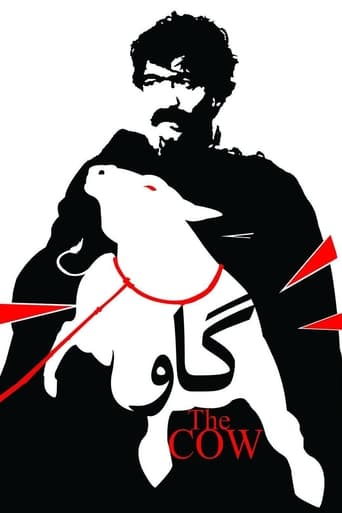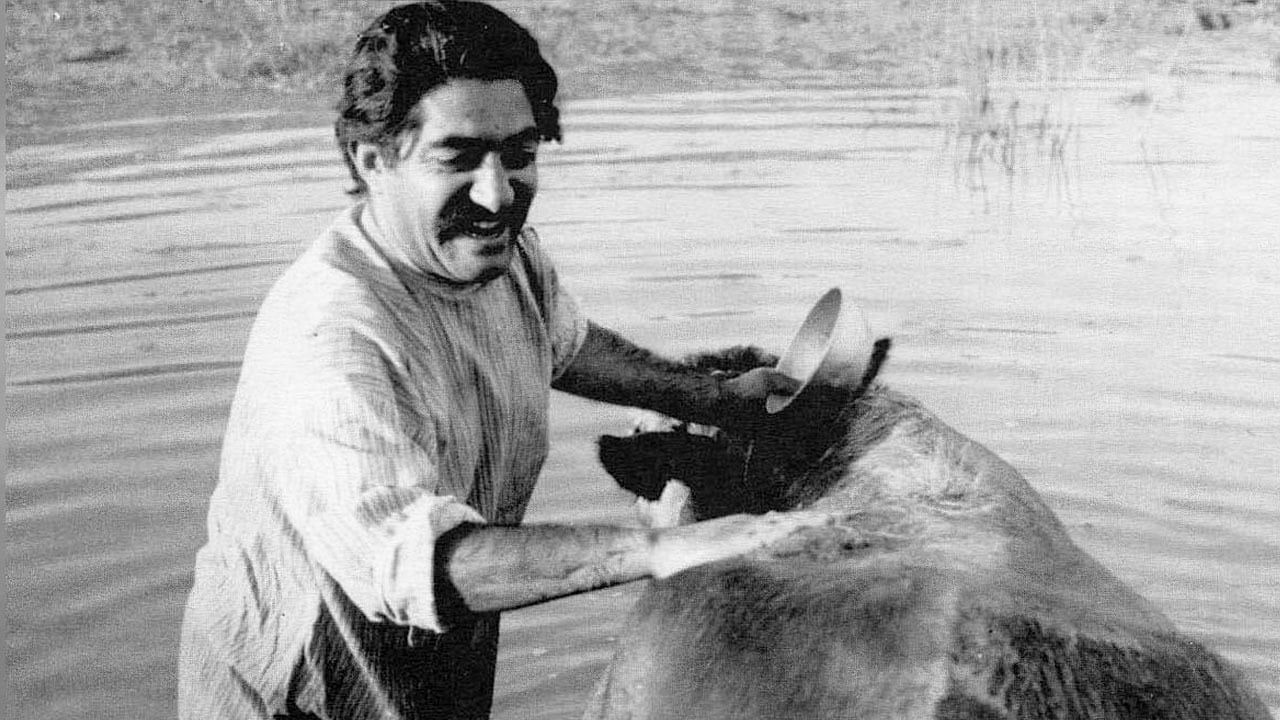Jackson Booth-Millard
The title of this Iranian film made it really obvious what the story would involve, but not necessarily in the way you would expect, I found it listed in the book 1001 Movies You Must See Before You Die, and I hoped it would be worth it. Basically in a remote and desolate village, middle-aged villager Masht Hassan (Ezzatolah Entezami) has a close relationship with his cow, the only one in the village, Hassan is married, but has no children. When Hassan goes away for a short time, the villagers look after his beloved and pregnant cow, but they find it dead. Knowing how much Hassan cherishes the cow, the villagers fear his reaction when he returns, so they decide to cover up the death and dispose of the corpse. When Hassan returns, they have covered up all evidence of the death, and they lie to him, telling him that the cow ran away. Hassan is unconvinced that his cow would ever run away, he is devastated and finds great difficulty in confronting by his loss, and the loss of livestock affects his social stature in the village. Hassan starts to spend more time in the barn, his grieving pushes him over the edge, and he has a nervous breakdown. Hassan goes insane and has developed boanthropy, a psychological disorder in which he believes himself to be a bovine, in other words, he believes he is the cow. Hassan has incorporated many cow-like mannerisms, including walking on his hands and knees, and eating hay, and the villagers cannot snap him out of it. In the end, his wife (Mahin Shahabi) and the villagers try a drastic method to cure his insanity, tie him up and drag him up a hill, it ends in tragedy when he runs away, and he falls to his death. Also starring Jamshid Mashayekhi as Abbas, Ali Nassirian as Islam, Khosrow Shojazadeh as Boy and Jafar Vali as Kadkhoda. I can see why this is considered an influential film, apparently it was banned as well, it is a very simple story, with themes of poverty, superstition and paranoia, it is both strange and fascinating to watch, a terrific drama. Very good!
Pierre Radulescu
This movie recalls Pasolini in mind, and also Parajanov.The subject is as simple as it can be: there is a village, poor and primitive, Hassan is the only one possessing a cow in the village, the cow dies, Hassan gets mentally insane.Is Hassan mad? Well, obviously. A man who believes that he is no more himself, but his cow, that's madness on all accounts.Madness? Hassan was living in his own universe ignoring the real world. But here's the point: Hassan had always lived in his own universe - he and his cow. A whole system of memories: events lived together. Natural phenomenons lived together and having a particular significance for them: a whole system of codes and signals. Was it full moon? It meant the cow was thirsty.This universe could not disappear once the cow was no more. The memories were still in place. The codes and signals were still in place. Was it full moon? It meant the cow was still thirsty.So Hassan was just defending now this universe of him; only his universe was no more fit with the world. Hence, the madness.Usually, when the beloved one is no more, the survivor is tempted to imagine that the other is still somewhere, not far. You go to the cemetery and speak to your beloved one, who is buried there. Hassan was trying something more forceful: to imagine that he, Hassan was somewhere, not far, and that the cow was here, in his body, instead of him! I know how it sounds, but it was Hassan's way to keep his universe.Meanwhile life was going on in this village. A bunch of clay houses surrounding a small dirty pool. Old men chatting at some kind of a tea house, old women attending silently the daily events and waiting for the outcome, the village idiot tortured by kids for mere distraction, the nightly incursions of neighboring villagers: just a small closed universe around a small dirty pond.Faced with the sudden madness of Hassan, the community comes to help, with great kindness and patience, to discover that help is sometimes useless and that kindness and patience have narrow limits.A tragic ballade telling us that some things happen just because that's their way to happen and nobody could change anything.
Dustin Luke Nelson
Iranian director Daruish Mehrjuti's 1969 masterpiece is an all too forgotten work of film-art in the canon. The piece explores inter-community relationships and the life changing forces of nature, what ties man to his surroundings, better than any contemporary American film could, and as so few American films have. The film follows Hassan, an Irani peasant, who owns the only cow in his village. The tight frames and slow pacing reveals a special relationship between Hassan and his cow. Which creates an especial pressing moral dilemma for the town when they discover the cow dead while Hassan is away. What follows is a dark harrowing vision of the depths of the human psyche and man's dependency on nature for survival. Shot in harsh black and white, it takes on the luscious countryside of Iran and the strength of community and the fallibility of human kindness. Hassan's journey is an engaging, dark tale that has been lauded as a controversial film at Cannes and a difficult digest for modern viewers. But few films pack the emotional intensity of Mehruji's film.
clevelandrachel
The Cow, Gaav (1969) is the second feature film by director Dariush Mehrjui. It was the second film to be financed by the Shah of Iran but promptly banned after completion when the Shah felt its portrayal of simple village life in Iran gave the wrong impression to outsiders. The film was smuggled out of Iran in 1970, and subsequently won "critics choice" at the Venice Film Festival.The Cow (originating from a novel by Iranian author Gholam-Hossein Saedi) portrays the obsession, loss of faith and demise of a poor rural village that loose their single salable commodity - a cow. Hassan, played by Ezatollah Entezami (who received best actor at the Chicago Film Festival), has a face that vividly captures his physical and emotional change after a breakdown when he becomes the cow. Mehrjui uses theater actors with "compelling faces" as key elements in the cinematography (Feridun Ghovanlu), as did the Italian Neo-realist.The film explores the looming fear of a foreign invader as the villagers come to believe Hassan, in his cow-like state, will be captured in cross-border raids from rival tribes. Politically this is reminiscent of the Shah's constant allusions to the neighboring "Arab threat" over oil. While set in traditional, rural Iran, Mehrjui shows an alternative view of Iran where collective fear and poverty can cycle in hopeless desperation. Viewers of The Cow are left to question the very root of human dignity.


 AD
AD


